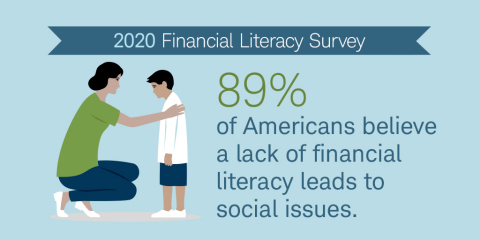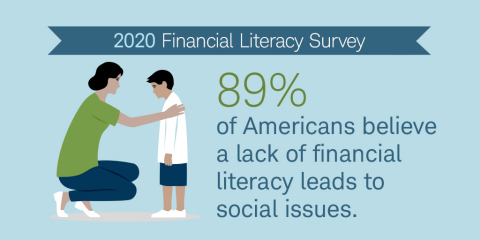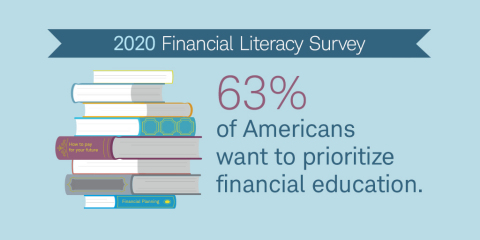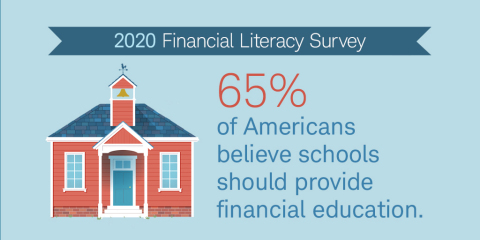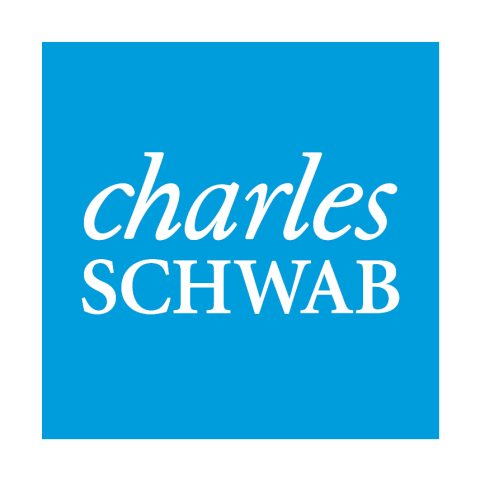SAN FRANCISCO--(BUSINESS WIRE)--As COVID-19 has extended beyond a health crisis into an economic crisis as well, it has exposed how financially vulnerable many Americans are. Half of all Americans (50%) would experience financial hardship if they had to cover an emergency expense of $1,000 or less in the next 30 days, according to a new Charles Schwab Financial Literacy Survey conducted by The Harris Poll.
Americans indicated they wish they had better money management skills, according to the survey. When asked what they would teach their younger selves about personal finance based on what they know today, Americans said the value of saving money (59%), basic money management (52%), and how to set financial goals and work toward them (51%).
Nearly two-thirds (63%) of U.S. adults chose financial education as the most important supplementary graduation requirement to math, English and science, compared to 43% who chose health and wellness education.
“Financial illiteracy is insidious. The antidote is financial education, which gives people the skills they need to make smart money decision and can help improve their lives,” said Carrie Schwab-Pomerantz, president of Charles Schwab Foundation. “The pandemic has underscored just how critical basic personal finance skills are in preparing for the unexpected. Financial literacy is a survival skill that everyone needs.”
On a scale of 1-100, Americans rated money management (62.9) as the most important skill for kids to learn, edging out the dangers of drugs and alcohol (60.5), healthy eating and exercise habits (58.3), and safe driving practices (57).
The impact of financial illiteracy is not lost on the American public. 89% of Americans agree that lack of financial education contributes to some of the biggest social issues our country faces, including poverty (58%), lack of job opportunities (53%), unemployment (53%), and wealth inequality (52%).
Despite the ongoing debate about virtual learning and how to reopen schools, most Americans (65%) still look primarily to schools to provide financial education, followed by government (12%) and employers (10%). Only 21 states currently require high school students to take a personal finance course.
“History shows that every time our country faces a crisis – whether it’s COVID-19, Hurricane Katrina, or 9/11 – the need for greater financial literacy becomes more apparent,” said Schwab-Pomerantz. “We are in a really uncertain time period when a lot of Americans are faced with difficult financial decisions that will have immediate and long-term effects on their lives.”
With millions of Americans out of work and the future of unemployment benefits uncertain, many people are questioning how best to manage their money right now. Schwab-Pomerantz recommends five key steps every American can take to help shore up their finances during this period of uncertainty.
- Start an emergency fund (or add more to it) to help protect yourself against an unexpected drop in income or expense shock. Set aside whatever you can – every little bit counts. Try to aim for $1,000-$2,000 to get started, and then work your way up to 3-6 month worth of essential expenses over time.
- Create a budget to help you prioritize and assess your financial resources. Self-isolation has led to different spending patterns for many people, including cutting back on what we may have previously thought of as “essential.”
- Create a financial plan to help you navigate from where you are to where you want to be. You don’t need to have a lot of money to need a financial plan. Consider it a roadmap to reach your financial goals, whether that’s to pay off debt, build savings, or make a large purchase.
- Ask for help if you’re struggling. Given the scale of this economic crisis, the government, lenders and creditors are trying to work with borrowers through this difficult time. Don’t hide from creditors – that can make things worse.
- Focus on what you can control. You can’t predict or control the market, but you can control how you manage your investments, your savings rate, having a financial plan and how you react to events.
About the 2020 Financial Literacy Survey
This survey was conducted online within the United States by The Harris Poll on behalf of Charles Schwab from June 4-8, 2020 among 2,046 U.S. adults ages 18 and older. This online survey is not based on a probability sample and therefore no estimate of theoretical sampling error can be calculated.
About Charles Schwab
At Charles Schwab, we believe in the power of investing to help individuals create a better tomorrow. We have a history of challenging the status quo in our industry, innovating in ways that benefit investors and the advisors and employers who serve them, and championing our clients’ goals with passion and integrity.
More information is available at aboutschwab.com. Follow us on Twitter, Facebook, YouTube, and LinkedIn.
About The Harris Poll
The Harris Poll is one of the longest-running surveys in the U.S. tracking public opinion, motivations, and social sentiment since 1963 that is now part of Harris Insights & Analytics, a global consulting and market research firm that delivers social intelligence for transformational times. We work with clients in three primary areas; building 21st century corporate reputation, crafting brand strategy and performance tracking, and earning organic media through public relations research. Our mission is to provide insights and advisory to help leaders make the best decisions possible. Learn more by visiting www.harrispoll.com and follow Harris Poll on Twitter and LinkedIn.
Disclosures:
Brokerage Products: Not FDIC Insured • No Bank Guarantee • May Lose Value
The Charles Schwab Corporation (NYSE: SCHW) is a leading provider of financial services, with more than 360 offices and 14.2 million active brokerage accounts, 1.7 million corporate retirement plan participants, 1.5 million banking accounts, and $4.3 trillion in client assets as of July 31, 2020. Through its operating subsidiaries, the company provides a full range of wealth management, securities brokerage, banking, asset management, custody, and financial advisory services to individual investors and independent investment advisors. Its broker-dealer subsidiary, Charles Schwab & Co., Inc. (member SIPC, www.sipc.org), and affiliates offer a complete range of investment services and products including an extensive selection of mutual funds; financial planning and investment advice; retirement plan and equity compensation plan services; referrals to independent, fee-based investment advisors; and custodial, operational and trading support for independent, fee-based investment advisors through Schwab Advisor Services. Its banking subsidiary, Charles Schwab Bank (member FDIC and an Equal Housing Lender), provides banking and lending services and products. More information is available at www.aboutschwab.com.
(0820-04XA)

